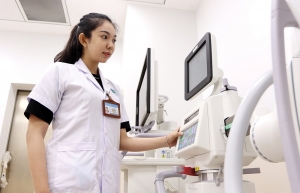INTERNATIONAL INVESTMENT
AND PORTAL
The Ministry of Health (MoH) in late May issued a number of legal documents with an aim to solve problems facing businesses and hospitals in procurement and bidding of drugs and medical supplies.
 Better procurement conditions crafted, Photo: Le Toan
Better procurement conditions crafted, Photo: Le Toan
This is as well as limitations in selection of bidders during centralised procurement, and in building bidding prices, thus creating a legal corridor for medical facilities to feel secure and proactively purchase drugs to ensure patient treatment.
A representative of the MoH told VIR that the ministry issued four circulars in one month to effectively implement the Law on Public Procurement 2023 and its guiding documents. Their contents have been developed to ensure compliance with practice and current legal regulations to further facilitate bidding activities.
“The drug lists for centralised procurement at the national level; the list of drugs, medical equipment, and testing supplies have prices negotiated and updated according to the principles and criteria to ensure compliance with practice, openness, transparency, and economic efficiency,” he added.
Circular No.05/2024/TT-BYT dated May 14 regulates the list of drugs, medical equipment, and also testing supplies that are subject to price negotiation and the process and procedures for supplier selection for bidding packages of price negotiation.
Circular 05 adds principles and criteria for vaccines for the national expanded immunisation programme to be applied for price negotiation. In addition, there are additional regulations on the list of medical equipment and testing supplies that are subject to price negotiation.
Circular No.07/2024/TT-BYT dated May 17 regulates drug bidding at public medical facilities regulates the development of the plan to select a bidder to ensure uniformity, clearly stating the quantity and content of the bidding package, clearly stating the time and price of the bidding package.
Specifically, Article 18 stipulates the application of designated bidders to help overcome drug shortages at facilities in urgent cases, and Article 35 adds regulations on additional purchase options to overcome drug shortages.
Circular No.03/2024/TT-BYT dated April 16 offers a list of drugs produced by domestic companies in production lines that meet EU-GMP principles or equivalent, and meets technical criteria according to the regulations of the MoH and of quality, price, and supply capacity.
Circular No.04/2024/TT-BYT dated April 20, meanwhile, regulates the list of national-level centralised procurement of drugs.
Health expert Hai Ngo said Circular 07 notes the right of medical facilities to buy and sell drugs outside the health insurance list to meet patient requirements.
“In addition to providing guidance on methods to build bidding package prices, with Circular 07, public health facilities can base on information on prices of drugs, medicinal herbs, and traditional medicines that win the bid according to the group of technical criteria of public health facilities, or winning centralised bids at the local level, or winning centralised bids at the national level, negotiating prices. This diversification will enable them to ensure the supply at affordable prices,” he added.
Senior health specialist Duyen Vo added that the planning and organisation of drug bidder selection is built across all levels, thereby reducing the volume of drug bidding.
“Drugs in the centralised procurement list will be regulated in quantity in accordance with the actual situation in each locality compared to original estimates, thus preventing local drug shortages, or abundances,” Vo said.
“Centralised procurement creates conditions for many bidders to participate, ensuring increased competition in bidding; create favourable time conditions for units to focus on professional tasks; helps ensure price consistency and stability, convenient for state management, payment of exam and treatment costs, and cost savings in bidding organisation,” she said.
Some are, however, concerned about enforcement. According to Hai Ngo, legal problems may arise, such as the current price negotiation list for medical equipment and testing supplies is still small, and needs to be supplemented. “The enforcement of the legal documents will be decisive factor for success of the legal documents. Thus, they should be supervised to ensure their effectiveness. Many countries do it well, and Vietnam can learn from them,” Hai Ngo noted.
 Hospitals ready for procurement reform
Hospitals ready for procurement reform
Hospital leaders continue to bemoan bidding and procurement of drugs and services remaining a slow and costly process, but new regulations may help ease the pain.



















